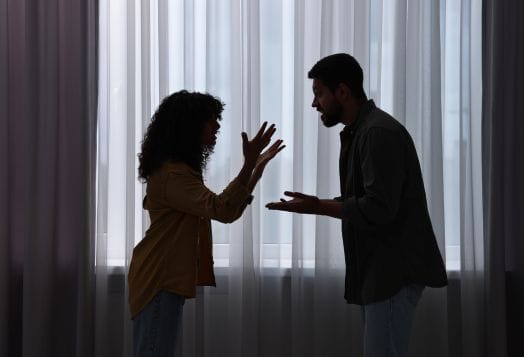Every relationship has a honeymoon phase, but challenges often arise when the magic fades. Even couples face roadblocks that can lead to resentment and misunderstandings if ignored. The good news is you don’t have to navigate these issues alone. Recognizing warning signs and learning to address a toxic relationship can make a difference. Let’s explore common couple problems.
Same Fight, Different Day: The Biggest Couple Struggles
Every couple has their fair share of disagreements, but when small issues turn into recurring conflicts, the relationship can start to feel exhausting. The little things like missed texts, forgotten dates, and unspoken frustrations can snowball into major problems if left unaddressed.
Understanding the most common relationship struggles can help you spot red flags early and prevent them from becoming deal-breakers. Let’s dive into the biggest couple problems that can shake even the strongest relationships.
1. Silent treatment, loud problems
Ever felt like you and your partner are speaking different languages? One of the biggest relationship killers is a communication breakdown. Conversations start feeling more like arguments, or worse, one of you just shuts down completely. Over time, unspoken frustrations pile up, creating a wedge between you.
Poor communication isn’t just about not talking—it’s about not listening, misinterpreting, or avoiding important conversations altogether. Maybe one partner expresses their needs, but the other dismisses them.
Maybe problems are swept under the rug instead of discussed, leading to a quiet resentment that simmers beneath the surface. Without clear and open dialogue, couples struggle to understand each other, leaving both parties feeling unheard, invalidated, and emotionally disconnected.
This is where couples counselling can step in to help partners understand each other’s communication styles and prevent those never-ending cycles of misinterpretation.
2. Every conversation turns into a battle
Arguments are normal in any relationship, but when every conversation starts feeling like a battle, something deeper is at play. It’s no longer just about solving the issue at hand—it’s about winning.
These kinds of conflicts often stem from unresolved resentment, differences in communication styles, or past wounds that never fully healed. Instead of addressing the actual problem, couples fall into cycles of blame, defensiveness, and personal attacks. A simple disagreement over dinner plans can spiral into accusations about never being appreciated.
A missed text can turn into a fight about feeling neglected. Over time, even minor issues trigger explosive reactions because they’re loaded with deeper frustrations. The result? A relationship that feels more like a battlefield than a place of comfort and support.
3. Fighting over unmet expectations

It starts small. A pile of unwashed dishes. Socks left on the floor. Forgotten anniversaries. But these seemingly minor frustrations often point to a much bigger issue: unmet expectations. Everyone enters a relationship with their own set of beliefs, values, and ideas about how love should look. Some expect grand romantic gestures, while others value everyday acts of service.
The problem? When these expectations aren’t met or, worse, aren’t even communicated, frustration builds. One partner may feel they’re constantly giving without receiving, while the other may feel unfairly criticized. Over time, what was once a happy partnership becomes a cycle of disappointment and resentment.
4. The relationship time bomb
Trust is the foundation of any relationship, but once cracks start to form, they’re hard to repair. Maybe one partner has a history of dishonesty, or maybe an old betrayal still lingers in the background. Even small breaches of trust, like hiding things, secret-keeping, or bending the truth, can spiral into full-blown suspicion and insecurity.
When trust is compromised, even innocent actions can start to feel suspicious. Text messages go unchecked, location-sharing becomes a demand, and “Where were you?” turns from casual curiosity to an interrogation. Over time, relationships built on doubt become emotionally exhausting, filled with second-guessing and constant reassurance-seeking. The lack of trust doesn’t just damage the bond; it makes genuine intimacy nearly impossible.
5. When life pulls you in different directions
In the honeymoon phase, it’s easy to feel like you and your partner are on the same page about everything. But as life moves forward, differences in priorities can start to surface. One of you is career-driven, while the other values work-life balance. One wants to start a family, while the other isn’t sure. One prioritizes financial security, while the other believes in “living in the moment.”
When major life goals don’t align, conflicts become unavoidable. The tension grows when neither partner feels supported in their individual aspirations. Over time, these unspoken frustrations can create emotional distance, making it feel like you’re living separate lives rather than sharing one.
Can Couple Therapy Really Help? Here’s What You Need to Know

Struggling relationships aren’t doomed—sometimes, they just need a little outside perspective. Here’s how couples counselling can make a real difference:
It helps you understand each other’s triggers and responses.
You learn healthy ways to express feelings without escalating conflicts.
A couple therapist creates a neutral space where both partners feel heard.
You gain tools to rebuild intimacy and trust rather than letting resentment take over.
Therapy isn’t about pointing fingers; it’s about finding solutions. Every relationship has challenges, but whether you work through them together or let them break you apart is up to you.
Love Takes Work, But it’s Worth it
No relationship is perfect, and that’s okay. The key is recognizing the struggles before they spiral out of control. If you’re facing constant fights, emotional distance, or trust issues, it might be time to hit pause and seek support.
A strong relationship isn’t about never having problems but working through them together. And if you need help along the way, a couple therapist might just be the game-changer you never knew you needed.
Disclaimer: This information provided is intended for general informational purposes only. It is not a substitute for professional advice or guidance. For personalised recommendations or specific concerns, please consult a certified couple therapist.




